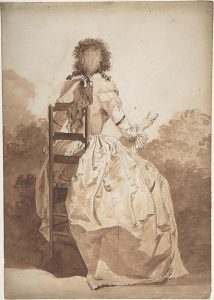Choose one of the following topics as a prompt when constructing your thesis. It is important for your essay to have both a thesis and specific evidence from the literature to support that thesis. Remember: saying that there are “similarities and differences” does not a thesis make. When comparing two or more things we can always find shared elements as well as disparate elements. In your thesis you need to specifically identify the grounds of your argument. Think of a thesis as the first step in proving your particular reading of a piece of literature.
The topics below are just that: topics. You will find an array of suggestions rather than prescribed questions. Furthermore, I have specified no texts. You will eventually “customize” the topic as you form your thesis. You need not feel compelled to answer all of these questions in your essay, and you should certainly also engage with questions of your own.
Guidelines: In responding to these prompts, you may choose to focus on one text but no more than two in detail. When appropriate, however, you may support your argument by drawing briefly on other texts. Indeed, this is a way to enrich and strengthen your argument.
- You may choose to develop one (or more) of your weekly responses into a longer essay. If you choose this option, please be aware that depending on the scope of the initial writing prompt, you may have to expand the parameters of your initial essay. See below for further details.
- Many of the works that we have read this semester either explicitly or implicitly represent an “ideal” eighteenth-century woman. Quite often that ideal’s virtues and failings are revealed through implicit and explicit comparison with other female characters and types, through both foils (female characters distinctly different from the ideal) and doubles (characters eerily both like and unlike the ideal). In your essay, construct an argument around the function of foils and/or doubles in texts intent upon representing the “ideal” eighteenth-century woman. In responding to this prompt, you’ll also want to consider the ways in which this ideal corresponds, contradicts, or complicates mainstream cultural norm.
- This prompt is the gendered double of the one above: the texts that we’ve read this semester have tended to focus upon the representation of feminine identity and subjectivity but they have also addressed questions of masculinity, male power, and the “education” of male figures. Based upon the texts that we’ve read this semester, who is the ideal “eighteenth-century man” and what are his attributes? Again, you’ll want to explore the ways in which this ideal corresponds, contradicts, or complicates mainstream cultural norms.
- Many of the texts that we’ve read this semester argue that education is the most crucial aspect of a young woman’s successful “entrance into the world.” However, there is not necessarily agreement about what constitutes the “best” education and its successful conclusion. You may structure your thesis as you choose but here are some things to consider when formulating your thesis:
- the value of retirement and sheltering protection vs. entering the world as an independent — although possibly unprotected — agent
- what is gained and what is lost after “entering the world”
- All of the texts that we’ve read this semester are carefully crafted literary constructions. This prompt asks you to focus on the significance of rhetorical and literary techniques when crafting your thesis about the text. For example, you might consider:
- the ways in which the “letter” functions in Burney’s Evelina where it is the primary mode of communication, or the significance of letters in other texts
- the cultivation of a distinction between author and speaking subject (or narrator) of a text
- the role that shifting focalization plays in a text
Paper Length: 5-7 pages
Please follow MLA guidelines from the MLA Handbook. If you don’t have an MLA Handbook, you should probably purchase one. The Purdue Owl website has been updated, however, and may be sufficient.
Refer to Writing Presentation 2019 for guidelines and expectations
Please turn all essays in electronically (google doc link or .doc to roxanne.eberle@gmail.com)
You will be asked to post a paragraph describing your essay on Tuesday, March 16th in lieu of your Weekly Writing assignment. You will be evaluated here on the progress you make in developing a viable thesis statement in response to one of the prompts. If you are choosing to develop a weekly writing response, please do indicate that you’re doing so and note how you are developing your short response into a 5-7 page essay.
A good description will: 1. indicate your thesis 2. suggest the structure of the essay 3. provide some evidence so that I can assist you in developing your essay.
Final Draft due by Saturday, March 20th at 9:00pm
